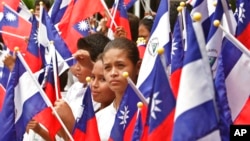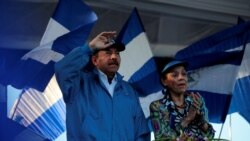Analysts say that Nicaragua and China timed their announcements of Managua’s diplomatic break with Taiwan to be “a great gift” from Beijing to Washington on the first day of the U.S. Summit for Democracy.
Nicaragua announced that it was establishing diplomatic relations with China on Thursday, and analysts who spoke with VOA Mandarin said that Nicaragua and China announced their decision to coincide with Taiwan’s presence at the summit, a de facto embrace of democracy at time when Beijing is punishing Taiwan for reinforcing ties with central European countries such as Lithuania.
More than 100 countries attended the summit, including liberal democracies, weaker democracies and even several states with authoritarian characteristics, according to VOA.
Neither Nicaragua nor China were invited to the summit because of their authoritarian governments.
On Thursday, Nicaragua’s government said that it recognized the People’s Republic of China as “the only legitimate government that represents all of China, and Taiwan is an inalienable part of the Chinese territory.”
Taiwan responded by breaking diplomatic ties with the Central American country and accusing Managua of disregarding a “longstanding and close friendship between the two peoples.”
Taiwan President Tsai Ing-wen said the island will not bend to pressure or change their determination to uphold democracy. “The more successful Taiwan's democracy is, the stronger the international support, and the greater the pressure from the authoritarian camp," she said in response to the announcement.
Since Tsai took office, Taiwan’s formal diplomatic allies – mostly small countries in the Pacific, Caribbean, Latin America and southern Africa – have pulled away, leaving it with 14 allies today, down from 21 in 2016.
On Friday, China’s Foreign Ministry spokesperson Hua Chunying praised Nicaragua’s move. She said on Twitter that “this is the right choice that is in line with the global trend and has people’s support.”
Hu Xijin, editor-in-chief of China’s state-backed media Global Times, said on Weibo that this is the price that the Tsai Ing-wen government has to pay “for their arrogance. … It also gave Washington a slap in the face as they held the ‘so called’ democracy summit,” he wrote.
“Nicaragua will not be the last country that cuts diplomatic relations with Taiwan. There’re 14 left, and soon there will be zero,” Hu continued.
Antonio Hsiang, co-author of Taiwan’s Relations with Latin America who focuses on Latin America at Taiwan’s Chihlee University of Technology, told VOA Mandarin that China and Nicaragua timed the announcement to retaliate against Taiwan and Washington.
“The timing is calculated. This can be regarded as ‘a great gift’ from Beijing to Washington on their first day of the Democracy Summit,” he told VOA Mandarin.
Chang Kuang-chiu, an associate professor at Chihlee University of Technology, agreed with that statement. He added that since Lithuania allowed Taipei to establish a de facto embassy in Vilnius using the name Taiwan in July, China has been waiting to take countermeasures.
“I’m actually surprised to see China has not severed diplomatic relations with Lithuania. But they have to make a big move, and this is the one,” he told VOA Mandarin in a phone interview.
The U.S. State Department criticized Nicaragua’s move and said the current government’s action “cannot reflect the will of the Nicaraguan people.”
“The sham election on November 7 did not provide it with any mandate to remove Nicaragua from the family of American democracies. Without the mandate that comes with a free and fair election, (President Daniel) Ortega’s actions cannot reflect the will of the Nicaraguan people, who continue to struggle for democracy and the ability to exercise their human rights and fundamental freedoms,” U.S. State Department spokesperson Ned Price said in a statement on Dec. 9.
Ortega, a Marxist in his youth, was reelected for a fourth term in a Nov. 7 election that U.S. President Biden said was not democratic.
"What Nicaraguan President Daniel Ortega and his wife, Vice President Rosario Murillo, orchestrated today was a pantomime election that was neither free nor fair, and most certainly not democratic," the president said in a statement on Nov. 7, adding the pair now run Nicaragua "as autocrats."
Since anti-government protests erupted in April 2018, government forces have killed more than 300 people, and the Ortega government has adopted repressive laws that restrict civil society and activism in the country.





